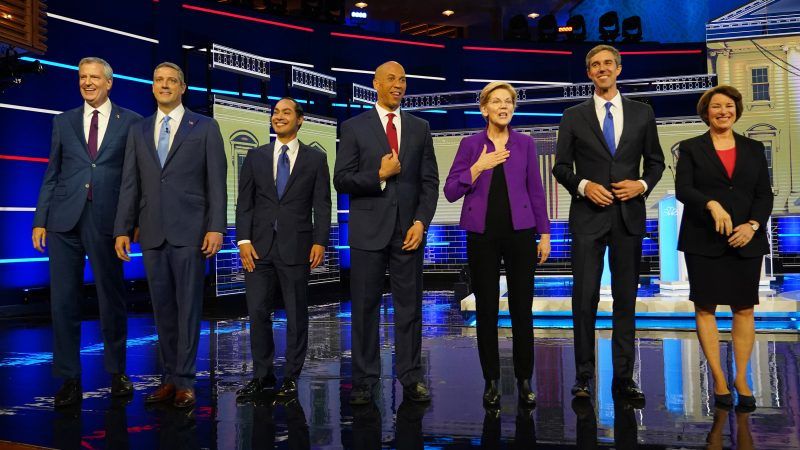Julian Castro's Bold Plan to Decriminalize Immigration Changed the Terms of the Debate Last Night
The former San Antonio mayor deserves credit for leading his party and perhaps the country in a better direction.

It's rare that a presidential debate accomplishes anything beyond sound and fury. But the Democratic debate last night may well prove to be a turning point in how America discusses immigration, thanks to the handling of the issue by Julian Castro, the former mayor of San Antonio. It is no secret that President Donald Trump's harsh border enforcement polices have made Democrats more pro-immigration than ever, as I wrote recently. However, the Democratic presidential contenders have been high on high-minded rhetoric but low on actual substance. Vague generalities, after all, soothe voters while specifics invite attacks from opponents.
But Castro, the grandson of a Mexican immigrant, is an exception. A few weeks ago he released a plan called "People First" that offered a serious roadmap for decriminalizing immigration and stopping tragedies like the one involving the drowning death of Central American father Oscar Ramirez and his 23-month-old daughter Valeria. The duo died earlier this week after border agents prevented them from entering the United States to request asylum, forcing the father, who'd already traveled 2,000 miles, to try and swim across the Rio Grande to touch U.S. soil.
America allowed unfettered mobility across the southern border until 1924 when things started going south, so to speak, never to recover. That year Congress passed a sweeping law that not only imposed strict immigration quotas based on nationality, but also created a border patrol force. Five years later, Congress made unauthorized entry a civil offense. In 1952, Congress turned that civil offense into a criminal one when it enacted the Immigration and Nationality Act and included Section 1325 in it.
Castro has made eliminating Section 1325 the linchpin of his reform proposal. Why? Because Section 1325 gave President Trump the legal tools to criminalize asylum seekers and take away their children.
How? Under U.S. law, migrants can legally request asylum, as Oscar and his family were trying to do, if they present themselves at a port of entry. However, under this administration, border patrol agents have been engaging in a practice called "metering"—that Castro also wants to eliminate— which involves turning away migrants before they can reach these ports. This forces the migrants to try and enter the United States between ports. Although they can still request asylum if they succeed, the problem is that, thanks to Section 1325, entering the U.S. in this way is a federal crime.
This has massive repercussions for migrant families with kids. Courts have barred border authorities from detaining kids for more than 20 days. But because the Trump administration insists that their parents are technically criminals, it wants to keep them in detention (and potentially prison), until their asylum petitions are heard, and even beyond that. In other words, to obey the courts, the authorities need to take the kids away from their detained parents.
Trump says that if Congress does not want this to happen it has to pass a law overruling the courts and allowing kids to be kept in detention along with the parents for long periods of time, even though it would cost American taxpayers $300 per day per immigrant to do so. Castro's alternative is to scrap Section 1325 altogether, so that these parents would not be considered criminals in the first place.
This proposal is a far cry from open borders. After all, being in the country without proper authorization would remain a civil—and therefore a deportable—offense. But it is a fundamental reform that neither the Bush nor the Obama administrations thought fit to include in their "comprehensive" reform proposals.
Even though Castro's candidacy is a long shot, he has already changed the terms of the debate. Castro put Beto O' Rourke, who is also trying to fashion himself as the champion of immigrants, on the defensive on the debate stage for not jumping on board. O'Rourke insisted that Section 1325 was needed to go after human trafficking and drug trafficking. But that makes zero sense given that there are already laws on the books that target those crimes.
Four of Castro's rivals—Sen. Cory Booker of New Jersey, Sen. Elizabeth Warren of Massachusetts, Washington Governor Jay Inslee, and Ohio Rep. Tim Ryan—however, threw in their lot with him on this issue. Indeed, Warren now says she'll go even further and scrap the law that makes repeat illegal entry a felony. (First time illegal entry is currently a misdemeanor.)
This is nothing short of stunning given that Democrats, historically, haven't been the amigos of immigrants. Indeed, labor union support has been crucial in passing every piece of restrictionist legislation in the country's history.
Castro deserves credit for leading his party—and perhaps the nation—in a different direction.


Show Comments (82)